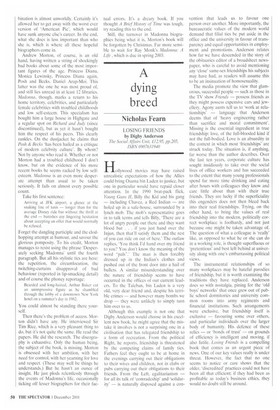An icon, but no illumination
Marcus Berlimann
MADONNA by Andrew Morton Michael O'Mara, £18, pp. 256, ISBN 185479888X One day, far in the future, someone in publishing will look across his desk at an aspiring writer and say the words that humanity has waited decades to hear: 'No, I don't think we need any more books on Madonna.' According to schoolboy legend, over half a million books have so far been written about the French Revolution, but the diminutive songstress must surely now be in second place. The former presaged an era of political turmoil and changed European history forever; the latter reached number one in 1986 with 'Papa, Don't Preach'. And yet, with lemming-like abandon, biographers keep leaping over the precipice, hoping that their 'definitive' Madonna book will be the one to make the millions they so deserve. Even Andrew Morton, who already has millions, cannot resist the temptation. Michael Holroyd's first volume (of a projected four) apparently follows in the new year.
What is it about her? Her voice? Her songs? Her remarkably resplendent pubic hair? (No, don't blanch. You and 1 and all adults currently alive have seen at least one photograph of Madonna flashing her pubes, and sure enough Morton has included one here.) Could it be her legendary' acting ability, or her compulsive need to change hairstyle every three or four hours? In truth, none of this matters at all. Her more technically difficult songs reveal a voice perpetually pushed to the limits of its ability. Her songwriting has always relied on the input of collaborators. But Madonna has star quality, that most mythic and unmeasurable of attributes, and she tops it off with an ambition so intense it's amazing she relaxes enough to sleep at night. Neither of these characteristics is easy for normal people to understand, and the com
bination is almost unworldly. Certainly it's allowed her to get away with the worst ever version of 'American Pie', which would have sunk anyone else's career. In the end, what she does is less important than who she is, which is where all these hopeful biographers come in.
Andrew Morton, of course, is an old hand, having written a string of shockingly had books about some of the most important figures of the age. Princess Diana, Monica Lewinsky, Princess Diana again, Posh and Becks, Daniel Arap-Moi. This latter was the one he was most proud of, and still lies unread in at least 12 libraries. Madonna, though, marks a return to his home territory, celebrities, and particularly female celebrities with troubled childhoods and low self-esteem. This specialism has bought him a large house in Highgate and a regular spot on Richard and Judy (since discontinued), but as yet it hasn't bought him the respect of his peers. This clearly rankles. On the dustjacket he claims that Posh & Becks 'has been hailed as a critique of modern celebrity culture'. By whom? Not by anyone who read it. Whether or not Morton had a troubled childhood I don't know, but on the evidence of his more recent books he seems racked by low selfesteem. Madonna is an even more desperate attempt than usual to be taken seriously. It fails on almost every possible count.
Take his first sentence:
Arriving at JFK airport, a glance at the snaking line of taxis — longer than for the average Disney ride but without the thrill at the end — banishes any lingering hesitation about accepting an offer that would normally be refused.
Forget the dangling participle and the clodhopping attempt at humour, and savour the glorious pomposity. To his credit, Morton manages to resist using the phrase 'Desperately seeking Madonna' until the fourth paragraph. But all his stylistic tics are here: the repetition, the circumlocution, the twitching-curtains disapproval of bad behaviour (reported in lip-smacking detail) and of course the phoney reportage: Bearded and long-haired, Arthur Baker cut an unimpressive figure as he shambled through the lobby of a downtown New York hotel on a summer's day in 1982.
You could almost be standing there yourself.
Then there's the problem of access. Morton didn't have any. He interviewed Sir Tim Rice, which is a very pleasant thing to do, but it's not quite the same. He read the papers. He did the research. The discography is exhaustive. Only the human being, the subject of the book, is missing. Morton is obsessed with her ambition, with her need for control, with her yearning for love and respect. (These may well be things he understands.) But he hasn't an ounce of insight. He just plods relentlessly through the events of Madonna's life, occasionally ticking off lesser biographers for their fac tual errors. It's a dreary book. If you thought A Brief History of Time was tough, try reading this to the end.
Still, the turnover in Madonna biographies being what it is. Morton's book will be forgotten by Christmas. Far more sensible to wait for Ray Monk's Madonna. A Life , which is due in spring 2003.





















































































 Previous page
Previous page